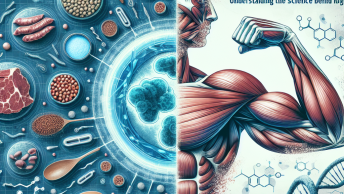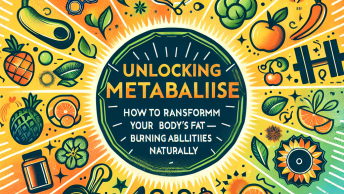When embarking on a health journey, many people mistakenly use the terms "fat loss" and "weight loss" interchangeably. However, these concepts are vastly different and understanding them can make a significant impact on your health goals. In this article, we’ll explore the key distinctions, debunk common myths, and provide practical tips for achieving effective fat loss, not just weight loss.
1. Defining Weight Loss and Fat Loss
Before diving deeper, it’s crucial to define these terms clearly.
-
Weight Loss refers to a reduction in overall body weight. This can include muscle, water, and fat. Therefore, one may see a scale decrease, but this does not necessarily indicate that they are losing fat specifically.
- Fat Loss, on the other hand, is the reduction of body fat specifically. This is a more targeted approach and reflects a healthier body composition.
Understanding this distinction is vital for setting realistic goals and methods.
2. Why Fat Loss is More Beneficial Than Weight Loss
While many people may feel pleased to see the number on the scale go down, fat loss is often more beneficial for long-term health and appearance. Here’s why:
-
Preserving Muscle Mass: Engaging in fat loss often involves maintaining or even building muscle, which contributes to better metabolism.
-
Health Improvements: Reducing fat, especially visceral fat around the organs, can lead to significant health improvements, including lower blood pressure, reduced cholesterol levels, and improved insulin sensitivity.
- Aesthetic Gains: Fat loss improves body shape and definition, leading to a more toned appearance, while weight loss alone can leave one looking gaunt or less fit.
3. Understanding Body Composition
It’s essential to understand that body composition refers to the proportions of fat, muscle, bone, and water in your body. Here are a few points to consider regarding body composition:
-
Muscle vs. Fat: Muscle is denser than fat, meaning it takes up less space in the body. Someone may look lean and fit but weigh more than someone who is “lighter” but carries more fat.
- Measuring Progress: Instead of focusing on scale weight, consider using body measurements or body fat percentage for a more accurate representation of your progress.
4. Common Myths About Weight Loss
There are numerous myths surrounding weight and fat loss. Here are a few to dispel:
-
Myth 1: All Weight Loss is Good Weight Loss: Rapid weight loss can lead to muscle loss and other health issues. Sustainable, gradual fat loss is preferable.
-
Myth 2: Cardio is the Best Way to Lose Weight: While cardio is beneficial, strength training is essential for preserving and building muscle, which is crucial for fat loss.
- Myth 3: One Diet Fits All: Everyone’s body responds differently to diets. It’s important to find a balanced approach that works for you personally.
5. Effective Strategies for Fat Loss
Now that we understand the differences between fat loss and weight loss, here are effective strategies for achieving fat loss:
A. Balanced Nutrition
-
Focus on Whole Foods: Incorporate whole, unprocessed foods into your diet, such as fruits, vegetables, lean proteins, and healthy fats.
- Caloric Deficit: For fat loss, a moderate caloric deficit is generally required. However, ensure that you’re still nurturing your body with enough energy to function optimally.
B. Strength Training
-
Lift Weights: Incorporate strength training exercises at least two to three times a week. This will not only help in building lean muscle but also enhance your metabolic rate.
- Compound Movements: Focus on compound exercises like squats, deadlifts, and bench presses, which work several muscle groups at once.
C. Incorporate High-Intensity Interval Training (HIIT)
-
Burn More Calories in Less Time: HIIT workouts can be shorter but more intense, leading to improved fat loss and metabolic health.
- Variety: HIIT can be applied to various forms of exercises, including cycling, running, and bodyweight movements.
D. Stay Hydrated
-
Water Intake: Adequate water consumption is important for metabolism and helps you feel fuller longer. Aim for at least 64 ounces of water daily.
- Limit Sugary Drinks: Avoid sugary beverages that can lead to increased calorie consumption without providing nutrition.
E. Get Quality Sleep
-
Rest is Crucial: Sleep plays a significant role in metabolic health. Aim for 7-9 hours of quality sleep per night.
- Hormonal Balance: Quality sleep helps regulate hormones related to stress and hunger, further supporting fat loss strategies.
6. Track Your Progress
Tracking your journey can help you stay motivated and fine-tune your approach. Here are some ways to measure progress effectively:
-
Body Measurements: Regularly measure areas like your waist, hips, and thighs instead of focusing solely on the scale.
-
Photos: Progress photos can provide visual documentation of changes that may not be evident on the scale.
- Body Fat Percentage: Consider utilizing tools or methods to measure body fat percentage for a more accurate representation of fat loss.
7. Long-Term Mindset Matters
Achieving fat loss is not just about temporary diets or exercise regimes; it’s about adopting a long-term healthy lifestyle:
-
Stay Consistent: Fat loss is a journey that requires consistency rather than perfection. Focus on incorporating sustainable habits into your daily life.
-
Set Realistic Goals: Set achievable, short-term goals that lead to long-term changes and celebrate small wins along the way.
- Positive Mindset: Cultivating a positive mindset can help you stay motivated and resilient through the ups and downs of your health journey.
8. The Importance of Education
As you embark on your fat loss journey, knowledge is power. Being informed about the principles of fat loss can make all the difference. Click Here to learn more about effective strategies and tips tailored to help you achieve your fat loss goals.
Conclusion
Understanding the difference between fat loss and weight loss is essential for anyone looking to improve their health and well-being. By focusing on fat loss rather than just weight loss, you set yourself up for better health outcomes, greater satisfaction, and a more sustainable approach to fitness. Remember that success lies in consistent healthy habits that promote overall well-being.






